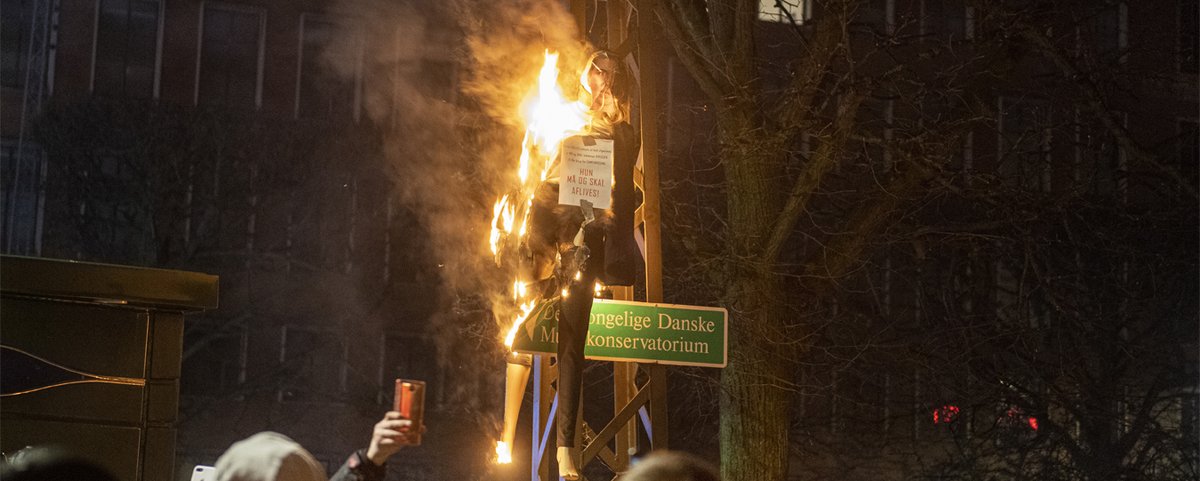A new study from the HOPE project can help explain Black Lives Matter protests as well as the burning of an effigy of the Danish prime minister, says professor Michael Bang Petersen.
09.08.2021 | MIA ULVGRAVEN
During a Men in Black protest in Copenhagen, an effigy depicting Danish prime minister Mette Frederiksen was set on fire. A sign said: “She must be put down.” Several people were arrested in connection with this protest against the government’s COVID-19 restrictions 23 January 2021. Photo: Kenneth Meyer/Ritzau Scanpix
The COVID-19 pandemic is not only detrimental to our health and economy. New research suggests that the pandemic also constitutes a psychological burden which can contribute to a destabilisation of the relationship between citizens and the state. Specifically, the research shows that people who experience the pandemic and the accompanying restrictions as particularly stressful are more motivated and engaged when it comes to protests and political violence. This is quite a notable correlation, though according to the researchers, not necessarily surprising.
“The pandemic has disrupted our normal way of living, generating frustrations, unprecedented social exclusion, and a range of other concerns,” says Michael Bang Petersen, professor of political science at Aarhus BSS, Aarhus University, and co-author on the paper which has just been published in the journal Psychological Science.
“Our investigations show that the psychological toll of living through a pandemic and its restrictions also stoked antigovernment and antisystemic attitudes that led to political violence in a number of countries,” says Michael Bang Petersen, who has conducted the study together with Henrikas Bartusevičius from the Peace Research Institute Oslo in Norway as well as Alexander Bor and Frederik Jørgensen from the Department of Political Science at Aarhus BSS, Aarhus University.
The researchers asked 6,000 adults from the United States, Denmark, Italy, and Hungary if and how the COVID-19 pandemic had negatively affected their health, finances, relationships, and rights. The interviewees were also asked to report if they felt dissatisfaction with their societies and governments and whether they were motivated to engage in or had already engaged in protests or political violence.
The results from this survey uncovered striking associations.
The people who reported the largest negative effects and who experienced the pandemic as a particularly heavy burden also expressed the most disruptive sentiments. And the more the burden grew during the pandemic, the more disruptive these sentiments became. In addition, they were more motivated to engage in violent protests. In contrast, they were not significantly more motivated to engage in peaceful forms of activism compared to people who felt less burdened by the pandemic and the accompanying restrictions.
“The results clearly show that we are speaking of disruptive forces,” says Michael Bang Petersen, at the same time underlining that in general, the motivation to engage in violence was low among the

"We know with certainty that the disruptive sentiments were triggered by something that happened during the pandemic. "
Michael Bang Petersen, professor of political science, Aarhus BSS, Aarhus University
Lesser burden in Denmark, but same effect
In the study, Danish respondents reported the lowest COVID-19 burden while Hungarian respondents reported the highest. But the effect was the same. Although relatively few Danes felt heavily burdened, the research shows that those who did feel more burdened reacted with the same antisystemic attitudes and disruptive inclinations as reported elsewhere.
“The comparatively low level of disruptive sentiments in Denmark might help explain why we have not seen large protests against the restrictions similar to those in many other countries. But protests did take place. We have seen violent conflicts with the police; the burning of an effigy of our prime minister during a protest; and a test site was set on fire. This is the kind of disruptive behaviour that the psychological burden of living during a pandemic and its restrictions can provoke,” says Michael Bang Petersen in consideration of this new research.
Racial unrest associated with COVID-19 burden
However, the research also shows that the psychological burden of the pandemic can provoke other protests than those against the COVID-19 restrictions. The researchers found that in the United States, those experiencing a higher COVID-19 burden were also more likely to report engagement in violence during the Black Lives Matter protests and counterprotests.
“The timing of the first Black Lives Matter protests is remarkable. They erupt in May 2020 following the murder of George Floyd and must of course be considered in the light of historical racial inequality and increasing political polarisation in the United States. But our data suggests that the outbreak of the pandemic a couple of months prior to this could very well have accelerated the Black Lives Matter movement, even though the protests were not directed at the way the government responded to COVID-19,” says Michael Bang Petersen.
The researchers cannot conclude with complete certainty that the psychological burden of the pandemic in itself leads to protests and violence, but the indication is strong. The interviewees were asked about their attitudes and engagement in political violence on two separate occasions.
"We know with certainty that the disruptive sentiments were triggered by something that happened during the pandemic. For example, the reason for the correlation is not that people who were already antisystemic and harboured violent tendencies happened to experience the pandemic as a heavier burden than others,” says Michael Bang Petersen.
About the result:
|
Contact
Michael Bang Petersen, professor of political science
Aarhus BSS, Aarhus University
michael@ps.au.dk
+45 20775944
